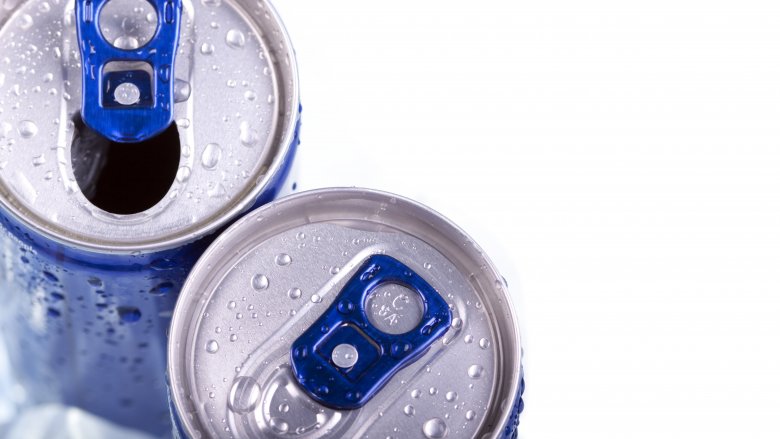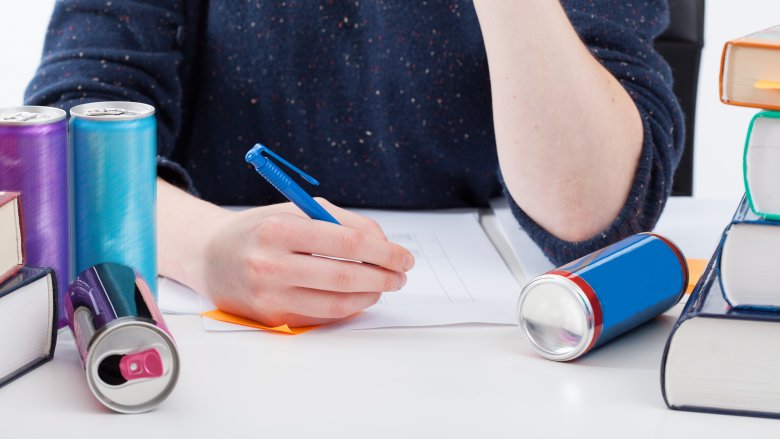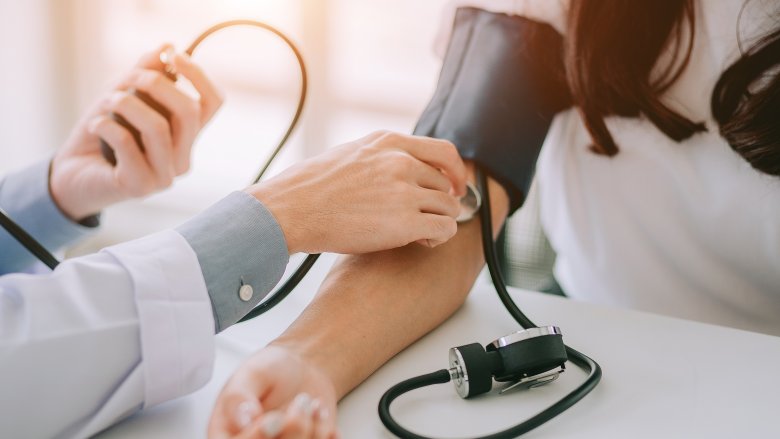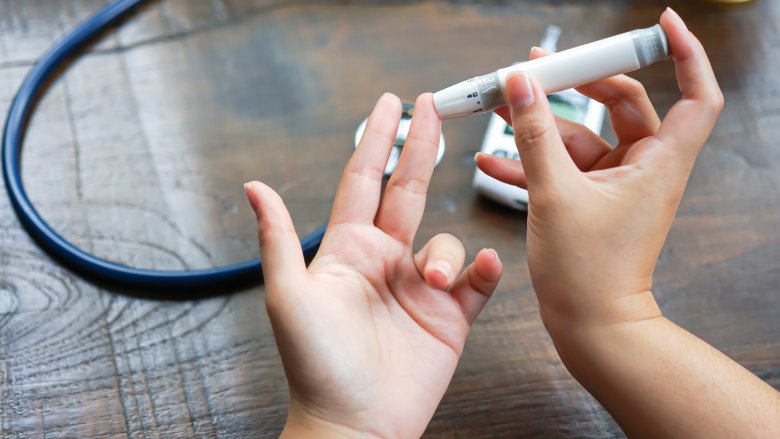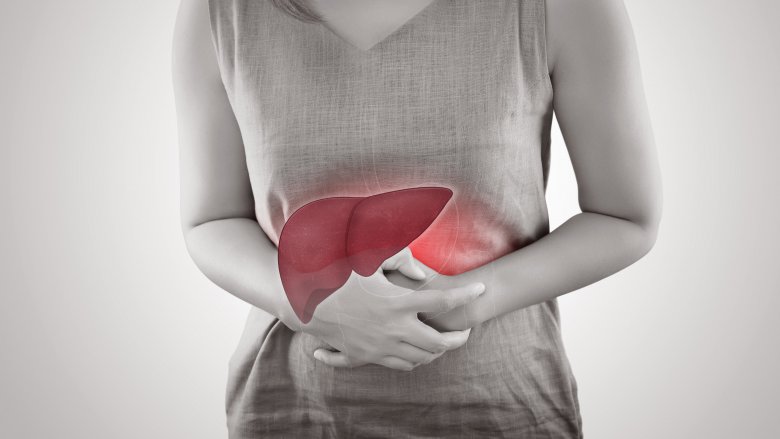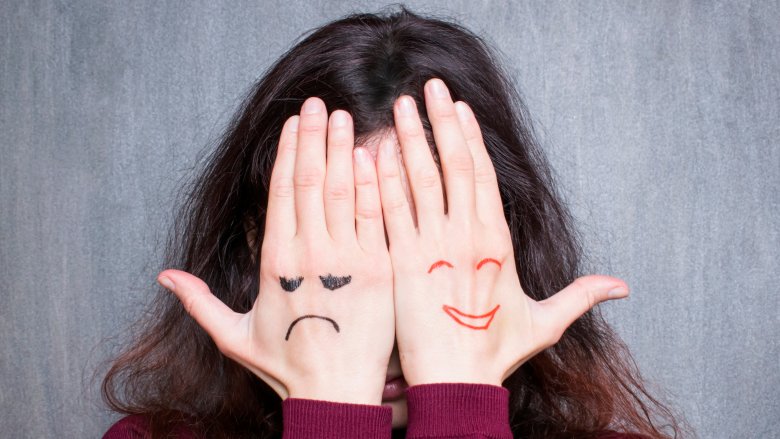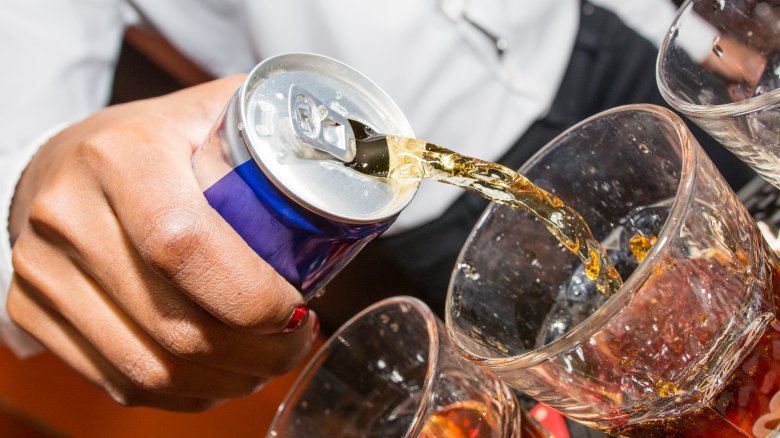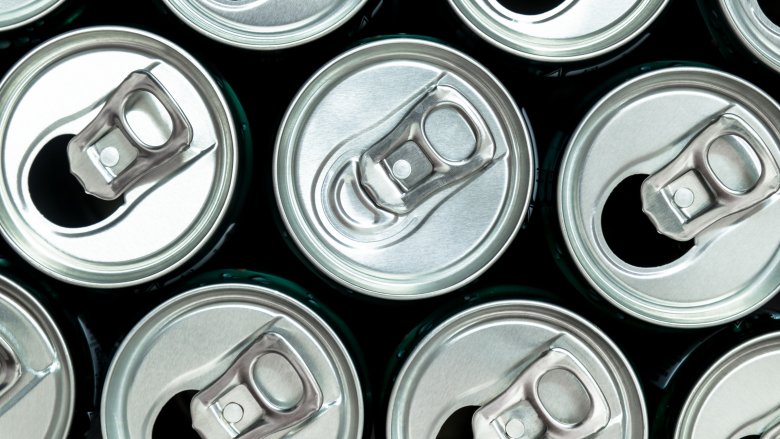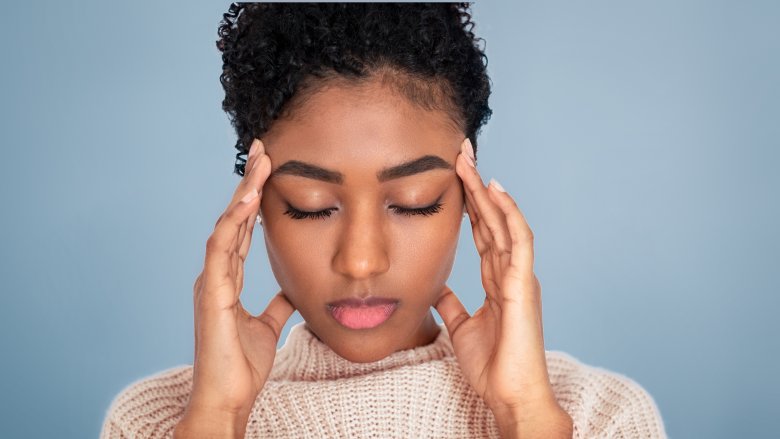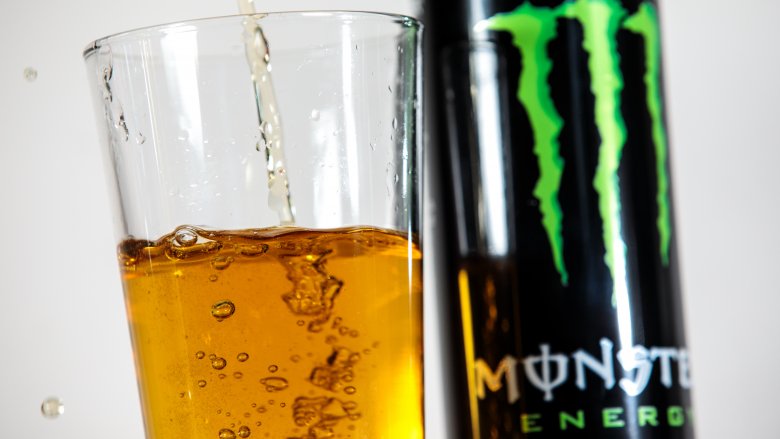What Happens When You Drink Too Many Energy Drinks
We may receive a commission on purchases made from links.
Having too many energy drinks may be a real concern for some, as the beverages remain a popular drink choice. Though many Americans may be consuming fewer sodas, the sales of energy drinks and energy shots have soared. According to Mintel data, these beverages brought in $13.4 billion in sales in 2017 alone. The energy drink biz is expected to keep on growing — at a rate of four to five percent annually — through 2022. Not to be outdone and outsold, Coca-Cola and PepsiCo have begun delving into the energy drink market as well, as CNBC reported in July 2019. But why all the fuss over these stimulating beverages?
Caleb Bryant, senior beverage analyst at Mintel, said energy drinks are seen as a solution for "increased energy needs among Americans." Bryant also noted that much of the success of energy drink sales can be attributed to a "large base of high frequency drinkers" in the United States. While that may be great for sales, there is such a thing as consuming too many energy drinks. Want to know what happens to the bodies of "high frequency drinkers" and how many of these cans you should really be gulping down? Keep reading.
How many energy drinks is too many energy drinks?
If you're not a fan of coffee or tea, you may find it easier to start your day with an energy drink. And, when that mid-afternoon slump hits, it's easy to just pop open and down another can, resulting in the consumption of one too many energy drinks. In doing so, though, you've already surpassed experts' recommendations. Katherine Zeratsky, a clinical dietitian at the Mayo Clinic in Rochester, Minn., told CNN Health, "Healthy adults who choose to drink energy drinks should not exceed one can per day." For children, even one is too much.
Back in 2011, the American Academy of Pediatrics (AAP) said children "should not consume energy drinks" — and their stance has not changed as of 2019. "Some cans or bottles of energy drinks can have more than 500 [milligrams] of caffeine, which is the equivalent of 14 cans of soda," Marcie Beth Schneider, pediatrician and member of the AAP Committee on Nutrition, explained, as shared by the academy. Although the amount of caffeine is stated on the can as required, Schneider said it can be "hard to tell how much caffeine is in a product by looking at the label."
But what about the benefits of having energy drinks?
If you drink an energy drink, you obviously want some energy, right? These beverages do indeed deliver on that front. One 2015 report revealed that consuming energy drinks may have beneficial effects on a person's physical performance. Earlier that year, researchers also noted that three milligrams of caffeine consumed via an energy drink "significantly [improved]" players' performance. A study conducted in 2013 found that an "energy shot can significantly improve important aspects of cognitive function for up to [six hours] compared to placebo in partially sleep-deprived healthy volunteers." Another study revealed that Red Bull energy drinks in particular were able to significantly improve aerobic endurance and anaerobic performance while cycling. Additionally, "significant improvements in mental performance" were also noted.
If these sound like good things, that's because they are. However, the bad most certainly outweighs the good. After analyzing the data on energy drinks, the 2015 report concluded that "although energy drink may have beneficial effects on physical performance, these products also have possible detrimental health consequences." As such, researchers said "marketing of energy drinks should be limited or forbidden until independent research confirms their safety, particularly among adolescents."
You could experience a caffeine overdose if you drink too many energy drinks
Caffeine is "the major constituent" in the majority of energy drinks — and it's also a huge part of the problem. A study on energy drink consumption revealed "they usually contain [80 to 150 milligrams] of caffeine per 8 ounces, which is equivalent to 5 ounces of coffee or two 12-ounce cans of caffeinated soda." Now, think of the last energy drink you had. Chances are it was, at least, 16 ounces. And what if you have more than one energy drink? Do the math and — yikes. That's a whole ton of caffeine.
Consuming too many energy drinks and thus too much of this stimulant can lead to a caffeine overdose. According to Healthline, severe cases can be life-threatening and cause you to experience trouble breathing, confusion, chest pain, and even convulsions. Milder symptoms are still unpleasant, including increased thirst, diarrhea, and dizziness. Because caffeine travels through breast milk, babies can also suffer from a caffeine overdose.
Of course, caffeine overdoses are completely preventable. "In most cases, you shouldn't have more than 400 milligrams of caffeine per day and even less if you're particularly sensitive to caffeine," the publication advised.
Your blood pressure and stress rises when you drink too many energy drinks
Even if you cut back on your energy drink consumption to just one can a day, it's possible that it's still too much. One 16-ounce energy drink could, in fact, be one too many. "In previous research, we found that energy drink consumption increased blood pressure in healthy young adults," Anna Svatikova, a cardiology fellow at the Mayo Clinic, revealed at the 2015 American Heart Association's Scientific Sessions, according to EurekAlert! "We now show that the increases in blood pressure are accompanied by increases in norepinephrine, a stress hormone chemical, and this could predispose an increased risk of cardiac events — even in healthy people."
Based on the results of the study, Svatikova further advised consumers to exercise caution when drinking energy drinks "due to possible health risks." Svatikova had some advice for doctors, too. "Asking patients about energy drink consumption should become routine for physicians, particularly when interpreting vital signs in the acute setting," she recommended. So if you want to stay healthy, you shouldn't drink too many energy drinks.
When you drink too many energy drinks, your blood thickens
After you drink too many energy drinks, you may notice that your heart pounds a little harder than normal. This is because your heart rate is elevated. That's not all that's going on inside, though. John Higgins, a sports cardiologist with McGovern Medical School at the University of Texas Health Science Center, told CNN Health that "energy drinks not only have been shown to raise stress levels, increase heart rate, increase blood pressure, [but] they've also been shown to make the blood a little bit thicker."
According to Higgins, caffeine is not solely to blame for this. It may be a case of how the caffeine interacts with the added ingredients like taurine. This amino acid can have an effect on the water and mineral levels in the blood. Guarana, a type of Brazilian shrub that naturally contains caffeine, is another common ingredient in energy drinks. Is adding additional caffeine to an already heavily-caffeinated beverage really necessary?
More research needs to be gathered to fully understand how these ingredients respond to one another. "They're sort of a black box," the cardiologist shared. "We really don't know a lot about them."
Your arteries can "lock up" if you drink too many energy drinks
Katherine Zeratsky, a clinical dietitian at the Mayo Clinic in Rochester, Minn., told CNN Health that the added "vitamins, amino acids and herbals" in energy drinks are "often in higher concentrations than naturally in food or plants, and the effects when combined especially with caffeine may be enhanced." Although taurine is indeed a natural amino acid — one that's found in meat and fish — it appears to be an especially dangerous addition to energy drinks.
"There's been several cases described of people that have gone into cardiac arrest after consuming more than one energy beverage, and when they've done sort of further analysis on these individuals, they haven't been able to find anything abnormal other than the very high levels of caffeine and taurine in the toxicology," John Higgins, a sports cardiologist with McGovern Medical School at the University of Texas Health Science Center, told the publication. He continued, "In one case, a young 28-year-old who drunk eight cans of an energy drink actually went into cardiac arrest, and they found his arteries of his heart were completely locked up." The tests revealed nothing unusual except "high levels of caffeine and taurine." Horrifying, no?
If you drink too many energy drinks, you may have an increased risk of type 2 diabetes
A 2014 study of energy drinks dubbed them "potions of illusion." Although the ads may promise better performance and more alertness, the study revealed that "energy drinks, despite having some short pleasant effects, can be harmful for the body and are best avoided."
The sugar content, in particular, is cause for concern. An additional study revealed that energy drinks typically contain 21 to 34 grams of sugar — be it glucose, high fructose corn syrup, or sucrose — per ounce. Even if you ignored all of the other stuff in energy drinks, this amount of sugar alone is enough to do some damage. As such, researchers report that "high energy drink intake may increase the risk of obesity and type 2 diabetes." Additionally, frequent consumption of energy drinks could lead to metabolic syndrome, which is a combination of "increased blood pressure, high blood sugar, excess body fat around the waist, and abnormal cholesterol or triglyceride levels," according to the Mayo Clinic.
You risk damaging your liver if you drink too many energy drinks
Although rare, drinking too many energy drinks has even been linked to hepatitis. BMJ Case Reports reported that a 50-year-old normally healthy man went to the emergency room with a litany of health symptoms, including anorexia, abdominal pain, nausea, vomiting, and jaundice. Test results revealed what appeared to be evidence of a chronic hepatitis C infection. A liver biopsy further revealed "severe acute hepatitis with bridging necrosis and marked cholestasis." It was bad.
The findings were strange for someone who denied ever having a blood transfusion, drinking alcohol, taking drugs, smoking cigarettes, or engaging in high-risk sexual behavior. The patient even denied taking prescription or over-the-counter medications. What he did do, though, was drink four to five energy drinks a day over the preceding three weeks. As a result, the publication revealed that "his liver injury was directly subsequent to excessive consumption of energy drinks." Thankfully, he got better after giving up energy drinks, but his case report is quite the cautionary tale.
When you drink too many energy drinks, you may experience mood swings
"Guarana stimulates the central nervous system," nutritionist Lisa Cohn explained to Reader's Digest. This is mainly because it has more caffeine than even a cup of coffee. "This provides a feeling of energy boost and mental clarity, and can reduce appetite," Cohn explained. However, it also causes "adverse energy drink side effects," which can even include mood swings. As highlighted above, drinking too many energy drinks can also lead to a caffeine overdose.
Guarana can be particularly dangerous because, often times, people don't know that it's a source of caffeine. Although energy drinks will list if the beverage contains "guarana extract," there's no requirement to say that it contains additional caffeine. "Some young adults have reported being sent to the emergency room because of overdoses of caffeine in the form of guarana-based drinks," nutritionist Beth Warren told the publication.
According to the Substance Abuse and Mental Health Services Administration, the number of emergency room visits involving energy drinks more than doubled from 2007 to 2011. Case reports revealed that some patients who consumed daily energy drinks presented with anxiety, irritability, aggressive outbursts, and mania.
Other psychological symptoms may present after you drink too many energy drinks
Energy drinks can have a direct effect on your brain, a report by the Department of Psychiatry at Trakya University in Turkey revealed. "Unwanted physical results are in the ... foreground, noticeable and visible," the researchers explained. But there is also data on "psychological problems" — more than mood swings — caused by drinking too many energy drinks.
According to the report, one previously healthy 21-year-old college student began drinking energy drinks after he started a new job. In less than two months, he wound up hospitalized at a psychiatric facility. He had little impulse control and self-care skills, and only responded to questions in "single words with a faint voice." His short-term memory was described as "disrupted," and his attention span was short.
"It was found that he had auditory and visual hallucinations and grandiose, persecution, and mystic delusions during observations in the ward," the researchers revealed. After 42 days in the hospital —without energy drinks — his symptoms disappeared. In the end, he was diagnosed with a "psychotic disorder related with consumption of energy drink" and discharged. With the increase in energy drink consumption, researchers expect to see similar cases.
You'll experience dental erosion when you drink too many energy drinks
The sugar content of energy drinks isn't exactly good for your teeth — but the sugar is actually the lesser of two evils. "We are well aware of the damage that sugar does in the mouth and in the whole body — the role it can play in obesity, diabetes, etc," Poonam Jain, an associate professor at the School of Dental Medicine at Southern Illinois University, told NPR. "But the average consumer is not very well aware that acid does all kinds of damage, too." And there is a lot of acid in energy drinks.
Jain and her team decided to conduct an experiment to compare sports drinks and energy drinks' effect on the teeth. Four times a day for five days, researchers poured the two kinds of beverages on molars in a petri dish, adding in artificial saliva — who knew? — in between each dousing. By the fifth day, they found that both teeth lost enamel, but the energy drinks took off a significant amount more. This is disconcerting, especially because beverage companies are not required to declare the amount of citric acid on their product labels.
If you drink too many energy drinks, you'll build a caffeine tolerance and get addicted
One of the big issues with drinking too many energy drinks is that they cause a person to build up a caffeine tolerance — and thus an addiction. At one point in time, you may have found one can of Red Bull or Monster Energy enough to give you a little boost. Before long, though, you may find yourself needing two or three — or more — just to get the same effect. If, for some reason, you aren't able to get your energy drink "fix," you'll find out just how addicted you really are.
One study found that when habitual caffeine drinkers abstained from the stimulant for 16 hours, they experienced withdrawal symptoms ranging from headaches to fatigue to flu-like symptoms. Additionally, the participants who abstained from caffeine were found to be even more fatigued and less alert, had more trouble concentrating, and experienced higher prevalences of mood disturbance and headaches compared to people who didn't regularly consume caffeine.
You could have a stroke if you drink too many energy drinks
It's not just energy drink withdrawal that can cause headaches. Just drinking an energy drink with guarana can lead to a headache, nutritionist Lisa Cohn confirmed to Reader's Digest. Quite the catch-22.
You shouldn't just write off these headaches though, especially if they're severe. Reversible cerebral vasoconstriction syndrome, or RCVS, causes a "severe thunderclap headache — the worst headache you've ever felt in your life," rheumatologist Rula Hajj-Ali told Cleveland Clinic's Health Essentials. "It comes on very intensely, within minutes." This syndrome can be triggered if you drink too many energy drinks, and it can, in turn, trigger a stroke.
"Energy drinks have megadoses of caffeine and sometimes other stimulants," Hajj-Ali explained. "We find that some people who use them come into the hospital with strokes or severe brain hemorrhages." Hajj-Ali added, "These are typically young, otherwise healthy people in their 30s and 40s." And there's really no telling who will be affected. "Some people who have been drinking energy drinks for some time become more sensitive to them as time goes on," the rheumatologist revealed. "Others are very sensitive to begin with, and can develop RCVS the first time they consume one."
Drinking too many energy drinks can potentially be fatal
Of all the hyperbolic claims energy drink manufacturers make, Red Bull may actually give you wings. Just not in the way you'd probably hope. Between 2009 and 2012, one energy drink company was cited as being possibly involved in 13 deaths, The New York Times reported.
In 2017, Anton Omelin, a habitual energy drink consumer, died after consuming alcohol with Red Bull, The News Tribune reported. His family filed a lawsuit against multiple energy drink companies in connection with his death. The companies, however, denied culpability.
The following year, a 16-year-old high school student, Davis Cripe, died from a cardiac event after drinking a Mountain Dew, coffee, and energy drink within the span of 40 minutes. "To him and most of these kids, they don't think it's anything different than a soda," Davis' parents explained to KUTV, which is exactly why they pushed for a ban prohibiting the sale of energy drinks to people under 18. As of this writing, though, energy drinks continue to be sold without restriction. But clearly drinking too many energy drinks should be avoided.

